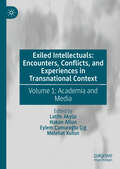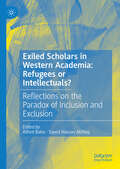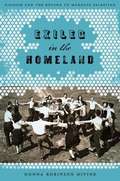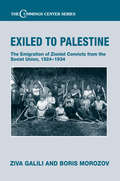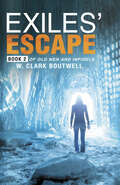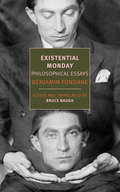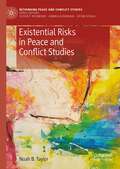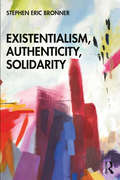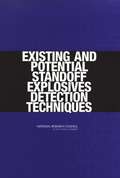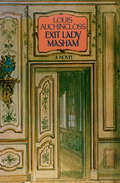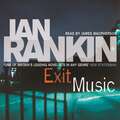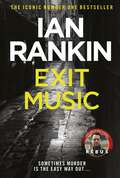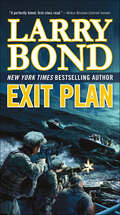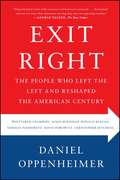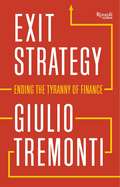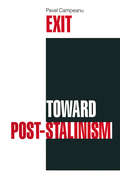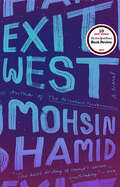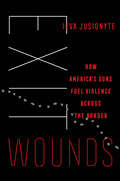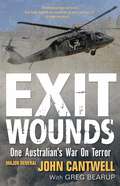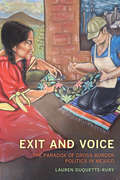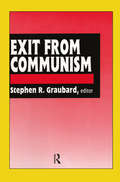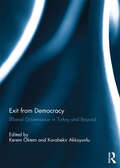- Table View
- List View
Exiled Intellectuals: Volume 1: Academia and Media
by Latife Akyüz Melehat Kutun Hakan Altun Eylem Çamuroğlu ÇığRight after the Gezi Resistance, a new tendency of authoritarianism rapidly emerged in Turkey and AKP government started targeting anyone it perceives as a threat to its rule, especially academics, journalists, politicians, actors, directors, i.e. the intellectuals who produce oppositional art and critical knowledge, criminalizing them as enemies of the state. The authoritarian regime has permeated every aspect of economic, social, cultural, and political life, institutionalized primarily through the ongoing state of emergency declared in the wake of the July 15, 2016 coup attempt (one might also consider this as a controlled and manipulated toxoid coup). This new climate has started to limit the opportunities of production and reproduction for the intellectuals and artists, and even holding a dissident stance became a source of risk on its own. The Republic of Turkey limited, oppressed and punished the means of expression by giving one of the harshest (and maybe the most violent) reactions of its history against critical thought and opposition. The culture of democracy, which was almost already non-existent, has been completely abolished through the suspension of democracy on the ostensible level. This ongoing period is one, in which producers of critical knowledge and opposing artists are being faced with immense oppression and penal sanctions. One of the outcomes of this process is a kind of new-nomadism that we can sketch out as “leaving behind”. And one of the forms of this leaving is (voluntary or involuntary) exile. The majority of those whom we call “new-exile intellectuals” today have relocated generally to Western Europe, Great Britain, the United States, and especially to Germany. This new wave of political forced migration, which started in the aftermath of the Gezi uprisings and gained momentum following the coup attempt, has been defined by the editors of the book as “new-exile”', in order to draw a framework, as it has some unique characteristics different from the previous waves. The fundamental property of this experience is the simultaneous mobilization of intellectual capital and (bi-polar) opposition. This oppositional stance is both against the dominant global order and against German-style authoritarianism as well as Turkish-style fascism. It is bi-polar in the context of exile. The form of the opposition in question has the ability to take root in the lands it arrives at. It does not point towards a single direction (forward or backward) and a single place (the place it was ruptured); it is here/now and multidirectional. This state of new-exile bears the efforts of existing critical knowledge and art producers in the “heim” to which they have relocated, as critical knowledge and art producers are opposed to the dominant world system as well as to fascism in Turkey. As political subjects of the resistance against authoritarianism, they are continuously and collectively fighting against the structural fate of displacement. As both subjects and researchers of this current state of new-exile, it is our primary responsibility to understand and produce knowledge of these intellectuals’ responses in this new life, to monitor the creation processes of the new mechanisms to cope with the challenges, and to understand/investigate the effects of all these on the transnational social space. We have tried to determine the content of this book based on our own experiences as new-exiled intellectuals. We believe that in this period of new-exile we are subjects and witnesses of a historic period due to our individual struggle for existence as well as our modes of organization and solidarity as a group of new-exiled intellectuals. On one hand, we know that while transforming ourselves, we pave the way for mutual interaction and the transformation of the structures in which we relate. This is precisely why the motivation behind the idea of compiling this book, lies not only in academic concerns such as analyzing t
Exiled Intellectuals: Volume 2: Politicians and Artists
by Latife Akyüz Melehat Kutun Hakan Altun Eylem Çamuroğlu ÇığRight after the Gezi Resistance, a new tendency of authoritarianism rapidly emerged in Turkey and AKP government started targeting anyone it perceives as a threat to its rule, especially academics, journalists, politicians, actors, directors, i.e. the intellectuals who produce oppositional art and critical knowledge, criminalizing them as enemies of the state. The authoritarian regime has permeated every aspect of economic, social, cultural, and political life, institutionalized primarily through the ongoing state of emergency declared in the wake of the July 15, 2016 coup attempt (one might also consider this as a controlled and manipulated toxoid coup). This new climate has started to limit the opportunities of production and reproduction for the intellectuals and artists, and even holding a dissident stance became a source of risk on its own. The Republic of Turkey limited, oppressed and punished the means of expression by giving one of the harshest (and maybe the most violent) reactions of its history against critical thought and opposition. The culture of democracy, which was almost already non-existent, has been completely abolished through the suspension of democracy on the ostensible level. This ongoing period is one, in which producers of critical knowledge and opposing artists are being faced with immense oppression and penal sanctions. One of the outcomes of this process is a kind of new-nomadism that we can sketch out as “leaving behind”. And one of the forms of this leaving is (voluntary or involuntary) exile. The majority of those whom we call “new-exile intellectuals” today have relocated generally to Western Europe, Great Britain, the United States, and especially to Germany. This new wave of political forced migration, which started in the aftermath of the Gezi uprisings and gained momentum following the coup attempt, has been defined by the editors of the book as “new-exile”', in order to draw a framework, as it has some unique characteristics different from the previous waves. The fundamental property of this experience is the simultaneous mobilization of intellectual capital and (bi-polar) opposition. This oppositional stance is both against the dominant global order and against German-style authoritarianism as well as Turkish-style fascism. It is bi-polar in the context of exile. The form of the opposition in question has the ability to take root in the lands it arrives at. It does not point towards a single direction (forward or backward) and a single place (the place it was ruptured); it is here/now and multidirectional. This state of new-exile bears the efforts of existing critical knowledge and art producers in the “heim” to which they have relocated, as critical knowledge and art producers are opposed to the dominant world system as well as to fascism in Turkey. As political subjects of the resistance against authoritarianism, they are continuously and collectively fighting against the structural fate of displacement. As both subjects and researchers of this current state of new-exile, it is our primary responsibility to understand and produce knowledge of these intellectuals’ responses in this new life, to monitor the creation processes of the new mechanisms to cope with the challenges, and to understand/investigate the effects of all these on the transnational social space. We have tried to determine the content of this book based on our own experiences as new-exiled intellectuals. We believe that in this period of new-exile we are subjects and witnesses of a historic period due to our individual struggle for existence as well as our modes of organization and solidarity as a group of new-exiled intellectuals. On one hand, we know that while transforming ourselves, we pave the way for mutual interaction and the transformation of the structures in which we relate. This is precisely why the motivation behind the idea of compiling this book, lies not only in academic concerns such as analyzing t
Exiled Scholars in Western Academia: Reflections on the Paradox of Inclusion and Exclusion
by Alfred Babo Sayed Hassan AkhlaqThis volume focuses on the experiences of refugee scholars in Western academia through first-hand narratives that move between dominant humanitarianism and the academic establishment. It provides an intellectual view of this humanitarian industry from a refugee perspective, alongside stories of the refugee scholars’ contribution to the production of knowledge in the West. Contributors discuss their unique experiences and reflect on the changing nature of knowledge production, transfer, and exchange in a world increasingly affected by forced migration. Such reflections are not new. However, in this volume they explore how personal life difficulties and/or successes, mixed with emotional distress and cultural adjustments, could be framed into a scholarly analysis of academia in exile. In today's globalized world, the term "refugee" often evokes both sympathy and criticism, leaving refugee scholars in Western universities to ponder the ambivalent nature of their identity. This duality of identity creates new opportunities for rethinking concepts such as humanitarianism, indigenization, asylum, diversity equity and integration, scholar activism, and the transnational production of knowledge in the universities of the twenty-first century. Assembling scholars from around the world working in political sciences, international studies, anthropology, law, philosophy, and the humanities, this volume addresses both the geopolitical predicaments and the intellectual contributions of exiled academics in our troubled times.
Exiled in the Homeland
by Donna Robinson DivineOffering a new perspective on Zionism, Exiled in the Homeland draws on memoirs, newspaper accounts, and archival material to examine closely the lives of the men and women who immigrated to Palestine in the early twentieth century. Rather than reducing these historic settlements to a single, unified theme, Donna Robinson Divine's research reveals an extraordinary spectrum of motivations and experiences among these populations. Though British rule and the yearning for a Jewish national home contributed to a foundation of solidarity, Exiled in the Homeland presents the many ways in which the message of emigration settled into the consciousness of the settlers. Considering the benefits and costs of their Zionist commitments, Divine explores a variety of motivations and outcomes, ranging from those newly arrived immigrants who harnessed their ambition for the goal of radical transformation to those who simply dreamed of living a better life. Also capturing the day-to-day experiences in families that faced scarce resources, as well as the British policies that shaped a variety of personal decisions on the part of the newcomers, Exiled in the Homeland provides new keys to understanding this pivotal chapter in Jewish history.
Exiled to Palestine: The Emigration of Soviet Zionist Convicts, 1924-1934 (Cummings Center Series #21)
by Ziva Galili Boris MorozovThis is the unknown story of how Zionists imprisoned by Soviet authorities were allowed to choose sentences of permanent departure to Palestine, where they helped build Jewish society, the backbone of left-wing parties, and the powerful trade union movement. These leading authors bring to light undiscovered documents from archives opened after the collapse of the Soviet Union and go on to revise fundamental assumptions about these events. They examine the means by which internal power struggles and personal interventions in the uppermost echelons of the Soviet leadership allowed the Zionists to disseminate their message and recruit thousands of members before the massive arrests of the mid-1920s; demonstrate the extent to which personal contacts between Zionists and those who aided them, Soviet leaders and members of the security services, were vital to initiating and sustaining the practice of substitution; and using a broad array of British and Zionist documents, they reveal the crucial role of Anglo-Zionist co-operation in facilitating the immigration of Zionist convicts. This book will of great interest to all students and scholars of Jewish and Israeli, Russian and Soviet and European and British history.
Exiles' Escape: Book 2 of Old Men and Infidels (Old Men and Infidels)
by W. Clark BoutwellIn this 2019 Prometheus Award Nominee spies, subterranean poet-socialists, virtual entities, interfaces, and people—both good and bad—wrestle the Fates for survival and supremacy in a twenty-second-century America.Nominated for the 2019 Prometheus Award for Best Novel! Malila is dead by her own hand—at least, that is what she hopes General Jourdaine and the entire Unity will believe. Middle-aged eighteen-year-old Malila Chiu has no choice but to escape her homeland. Making common cause with the strange subterranean workers of the beltways, Malila perseveres toward freedom in the Scorched fields of America. Nearly naked, with no friends, no resources and only a scant idea of the route, Malila&’s only real information comes from time in the outlands. While a captive of the old, harsh-and-tender-by-turns Jesse Johnstone, Malila learned of the lies told her by her homeland and the truths shown her by the arrogant and contradictory Jesse. She thinks she may love him. If only he were not so strange . . . Pursuing Malila and becoming more obsessed with each failure, Jourdaine moves closer at each turn. Jesse, once again the target for assassination from old enemies, escapes to the skies, using a huge new American R-ship, the Illinois, in his own attempt to find Malila. Spies, subterranean poet-socialists, virtual entities, interfaces, and people—both good and bad—wrestle the Fates for survival and supremacy in a twenty-second-century America.
Existential Monday: Philosophical Essays
by Benjamin Fondane Bruce BaughBenjamin Fondane--who was born and educated in Romania, moved as an adult to Paris, lived for a time in Buenos Aires, where he was close to Victoria Ocampo, Jorge Luis Borges's friend and publisher, and died in Auschwitz--was an artist and thinker who found in every limit, in every border, "a torture and a spur." Poet, critic, man of the theater, movie director, Fondane was the most daring of the existentialists, a metaphysical anarchist, affirming individual against those great abstractions that limit human freedom--the State, History, the Law, the Idea. Existential Monday, the first selection of his philosophical work to appear in English, includes four of Fondane's most thought-provoking and important texts, "Existential Monday and the Sunday of History," "Preface for the Present Moment," "Man Before History" (co-translated by Andrew Rubens), and "Boredom." Here Fondane, until now little-known except to specialists, emerges as one of the enduring French philosophers of the twentieth century.
Existential Risks in Peace and Conflict Studies (Rethinking Peace and Conflict Studies)
by Noah B. TaylorThis book explores the topic of peace and the long-term survival of the human species. Drawing on Existential Risk Studies (ERS), the book lays out a theoretical framework for drawing new perspectives and approaches for looking toward the future and addressing existential risks related to the complexity and dynamics of conflict. Looking at five research lines in Peace and Conflict Studies (PCS); (1) Great Powers Conflict, (2) Peace, Pandemic, and Conflict, (3) Climate, Peace, and Conflict, (4) Emerging Technologies, Peace, and Conflict and (5) Totalitarianism, the chapters discuss how these lines are defined and discussed, how they are understood in ERS, and what approaches would be beneficial to adapt and integrate into PCS. By drawing on ERS and grounding the discussion in lines of research that will be important to the field of PCS, this book suggests that long-term perspectives are needed in the field, especially in regard to existential risk and their implications of conflict.
Existentialism, Authenticity, Solidarity
by Stephen Eric BronnerWhat makes individuals what they are? How should they judge their social and political interaction with the world? What makes them authentic or inauthentic? This original and provocative study explores the concept of "authenticity" and its relevance for radical politics. Weaving together close readings of three 20th century thinkers: Martin Heidegger, Karl Jaspers and Jean-Paul Sartre with the concept of authenticity, Stephen Eric Bronner illuminates the phenomenological foundations for self-awareness that underpin our sense of identity and solidarity. He claims that different expressions of the existential tradition compete with one another in determining how authenticity might be experienced, but all of them ultimately rest on self-referential judgments. The author’s own new framework for a political ethic at once serves as a corrective and an alternative. Wonderfully rich, insightful, and nuanced, Stephen Eric Bronner has produced another bookshelf staple that speaks to crucial issues in politics, philosophy, psychology, and sociology. Existentialism, Authenticity, Solidarity will appeal to scholars, students and readers from the general public alike.
Existing And Potential Standoff Explosives Detection Techniques
by National Research Council of the National AcademiesFunded by the U. S. Department of Defense, this report was written to assist the Defense Advanced Research Projects Agency in its efforts to develop more effective, flexible explosive and bomb detection systems. The study describes the characteristics of explosives, bombs, and their components that are or might be used to provide a signature for exploitation in detection technology; considers scientific techniques for exploiting these characteristics to detect explosives and explosive devices, discusses the potential for integrating such techniques into detection systems, allowing sufficient sensitivity without an unacceptable false-positive rate; and proposes additional research in practical explosives and bomb technology in the near, mid, and long term. No subject index. Annotation ©2005 Book News, Inc. , Portland, OR (booknews. com)
Exit Lady Masham: A Novel
by Louis AuchinclossIn this witty historical novel by the author of Watchfires, a poor woman joins the eighteenth-century court of Queen Anne and ends a war.On the Continent, John Churchill, Duke of Marlborough, is laying waste to the lowlands in a bloody combat with Louis XIV. Meanwhile at the British court, Queen Anne, aging, ill, and surrounded by sycophants, is coping with the intrigues of those who wish to promote Marlborough’s dangerous ambitions. Chief among the plotters is his headstrong wife (and court favorite), Sarah Churchill.Into this tense and steamy environment comes young Abigail Hill, Sarah’s impoverished cousin. Sarah has arranged for her to be a maid to the Queen. But Abigail will discover that she has been marked by destiny for a special mission, which is nothing less than to bring to a halt a destructive world war. How she accomplishes this is the subject of this unusual but historically justified tale . . .The drama of court life and high politics, the growing antagonism between Sarah and Abigail, and an engaging cast of characters make for a lively narrative. And the portrait of Queen Anne is a tour de force that lends further depth to this vivid and engaging book.Perfect for fans of the Yorgos Lanthimos film, The Favourite, starring Olivia Coleman and Emma Stone.
Exit Music: From the Iconic #1 Bestselling Writer of Channel 4’s MURDER ISLAND (A Rebus Novel)
by Ian RankinIt's late autumn in Edinburgh and late autumn in the career of Detective Inspector Rebus. As he tries to tie up some loose ends before retirement, a murder case intrudes. A dissident Russian poet has been found dead in what looks like a mugging gone wrong. By apparent coincidence, a delegation of Russian businessmen is in town - and everyone is determined that the case should be closed quickly and clinically.But the further they dig, the more Rebus and DS Siobhan Clarke become convinced that they are dealing with something more than a random attack - especially after a particularly nasty second killing. Meanwhile, a brutal and premeditated assault on a local gangster sees Rebus in the frame. Has the Inspector taken a step too far in tying up those loose ends? Only a few days shy of the end to his long, inglorious career, will Rebus even make it that far?Read by James Macpherson(p) 2007 Orion Publishing Group
Exit Music: From the iconic #1 bestselling author of A SONG FOR THE DARK TIMES (A Rebus Novel)
by Ian RankinSometimes murder is the easy way out...A brilliant Rebus novel from the No.1 bestselling author of A SONG FOR THE DARK TIMES.'Britain's No.1 crime writer' Daily Mirror'Ian Rankin is a genius' Lee ChildA mugging gone wrong ... or murder?A dissident Russian poet is found dead - at the same time a delegation of Russian businessmen arrives in town. For some, it is crucial that the case is closed quickly, clinically and with the minimum of attention.But DI Rebus and DS Siobhan Clarke believe this is something more than a random attack - especially after a particularly nasty second killing. Then, a brutal and premeditated assault on a local gangster puts Rebus in the frame - and he may not survive long enough to solve anything...
Exit Music: From the iconic #1 bestselling author of A SONG FOR THE DARK TIMES (A Rebus Novel)
by Ian RankinSometimes murder is the easy way out...A brilliant Rebus novel from the No.1 bestselling author of A SONG FOR THE DARK TIMES.'Britain's No.1 crime writer' Daily Mirror'Ian Rankin is a genius' Lee ChildA mugging gone wrong ... or murder?A dissident Russian poet is found dead - at the same time a delegation of Russian businessmen arrives in town. For some, it is crucial that the case is closed quickly, clinically and with the minimum of attention.But DI Rebus and DS Siobhan Clarke believe this is something more than a random attack - especially after a particularly nasty second killing. Then, a brutal and premeditated assault on a local gangster puts Rebus in the frame - and he may not survive long enough to solve anything...
Exit Plan: A Jerry Mitchell Novel (The Jerry Mitchell Novels #3)
by Larry BondJerry Mitchell is on exercises off the coast of Pakistan when his submarine, the USS Michigan, is ordered to a rendezvous off the Iranian coast. Once there, disembarked SEALs---experts in seaborne commando operations---are to extract two Iranian nationals who have sensitive information on Iran's nuclear weapons program. While en route to shore, Michigan's mini-sub suffers a battery fire, killing one crew member and forcing the survivors---four SEALs and LCDR Mitchell---to scuttle their disabled craft and swim for shore. There they find the two Iranians waiting for them, but their attempts at returning to Michigan are thwarted by heavy Iranian patrol boat activity. When agents of Iran's secret police, VEVAK, appear, escape seems all but impossible. When Mitchell and his men find themselves surrounded by Iranian Revolutionary Guards Corp troops, they create a bold plan to escape by sea. It's a desperate gamble, but it's the only way to get proof of the Iranian plot to the U.S. . . . and prevent a devastating new war.At the Publisher's request, this title is being sold without Digital Rights Management Software (DRM) applied.
Exit Right
by Daniel OppenheimerA provocative, intimate look at the evolution of America's political soul through the lives of six political figures--from Whittaker Chambers to Christopher Hitchens--who abandoned the left and joined the right.In Exit Right, Daniel Oppenheimer tells the stories of six major political figures whose journeys away from the left reshaped the contours of American politics in the twentieth century. By going deep into the minds of six apostates--Whittaker Chambers, James Burnham, Ronald Reagan, Norman Podhoretz, David Horowitz, and Christopher Hitchens--Oppenheimer offers an unusually intimate history of the American left, and the right's reaction. Oppenheimer is a brilliant new voice in political history who has woven together the past century's most important movements into a single book that reveals the roots of American politics. Through the eyes of his six subjects, we see America grow, stumble, and forge ahead--from World War I up through the Great Depression and World War II, from the Red Scare up through the Civil Rights Movement, and from the birth of neoconservatism up through 9/11 and the dawn of the Iraq War. At its core, Exit Right is a book that asks profound questions about why and how we come to believe politically at all--on the left or the right. Each of these six lives challenges us to ask where our own beliefs come from, and what it might take to change them. At a time of sky-high partisanship, Oppenheimer breaks down the boundaries that divide us and investigates the deeper origins of our politics. This is a book that will resonate with readers on the left and the right--as well as those stuck somewhere in the middle.
Exit Strategies Policy Options for Countries Seeking Greater Exchange Rate Flexibility
by Barry Eichengreen Paul Masson Esteban Jadresic Hugh Bredenkamp Barry Johnston Javier HamannIn a world of increasing capital mobility and broadening and more diversified trade, many (but not all) developing and transition economies are likely to find it desirable to move from relatively fixed exchange rate regimes to regimes of greater exchange rate flexibility. This paper suggests why, and considers strategies that countries may consider for such a move. It reinforces this discussion with a review of experience from teh past two decades with alternative exchange rate regimes. the paper also identifies policies that can facilitate the transition to greater exchange rate flexibility for countries that wish to pursue this option.
Exit Strategy: Ending the Tyranny of Finance
by Giulio TremontiFrom Italy's former minister of economy and finance, a provocative and galvanizing jeremiad on the Euro crisis and the global economic status quo. As Europe's debt crisis persists and the aftershocks of the 2008 collapse hinder recovery across the globe, Giulio Tremonti underscores the dangers that unchecked financial markets pose to democracy, and explains what nations must do to protect their autonomy. Condemning what he calls "marketism"--an insidious ideology that puts the speculative financial market above all else--Tremonti bemoans a world in which finance, not governments, sets the rules and, as a result, determines political discourse. But when finance fails, it is the people who must pay the price, and not just economically. An instant and enduring bestseller in Italy, Exit Strategy calls for sweeping changes in both policy and mindset. Candid and critical as few politicians have been in the aftermath of the crisis, Tremonti breaks down the systemic failures of global finance and proposes a "New Alliance" between citizens and governments to free politics from the thrall of the financial markets, and put the people themselves back in control.
Exit Toward Post-Stalinism
by Pavel CompenauHow does a society emerge from Stalinism? This is the question of the day in Eastern Europe. In this final volume of his trilogy on Stalinism, Campeanu examines the main pillars of the Stalinist system - the vacuum of ownership and the regulation of all social and economic activity by a central power endowed with infallibility. Only if both of these conditions are eliminated, Campeanu argues, can Stalinism finally be overcome. Attempts only to reform, to modify, to ameliorate, to eliminate "excesses" will ensure that society stays in a perpetual dead-end. How does perestroika measure up against this standard? What are the stakes in Moscow, in Beijing? It is to be able to answer questions such as these that Campeanu undertook this work.
Exit West: A Novel
by Mohsin HamidOne of The New York Times&’s 100 Best Books of the 21st CenturyFINALIST FOR THE BOOKER PRIZE & WINNER OF THE L.A. TIMES BOOK PRIZE FOR FICTION and THE ASPEN WORDS LITERARY PRIZE &“It was as if Hamid knew what was going to happen to America and the world, and gave us a road map to our future… At once terrifying and … oddly hopeful.&” —Ayelet Waldman, The New York Times Book Review &“Moving, audacious, and indelibly human.&” —Entertainment Weekly, &“A&” rating The New York Times bestselling novel: an astonishingly visionary love story that imagines the forces that drive ordinary people from their homes into the uncertain embrace of new lands, from the author of The Reluctant Fundamentalist and the forthcoming The Last White Man. In a country teetering on the brink of civil war, two young people meet—sensual, fiercely independent Nadia and gentle, restrained Saeed. They embark on a furtive love affair, and are soon cloistered in a premature intimacy by the unrest roiling their city. When it explodes, turning familiar streets into a patchwork of checkpoints and bomb blasts, they begin to hear whispers about doors—doors that can whisk people far away, if perilously and for a price. As the violence escalates, Nadia and Saeed decide that they no longer have a choice. Leaving their homeland and their old lives behind, they find a door and step through. . . . Exit West follows these remarkable characters as they emerge into an alien and uncertain future, struggling to hold on to each other, to their past, to the very sense of who they are. Profoundly intimate and powerfully inventive, it tells an unforgettable story of love, loyalty, and courage that is both completely of our time and for all time.
Exit Wounds: How America's Guns Fuel Violence across the Border (California Series in Public Anthropology #57)
by Ieva JusionyteTurns the familiar story of trafficking across the US-Mexico border on its head, looking at firearms smuggled south from the United States to Mexico and their ricochet effects. American guns have entangled the lives of people on both sides of the US-Mexico border in a vicious circle of violence. After treating wounded migrants and refugees seeking safety in the United States, anthropologist Ieva Jusionyte boldly embarked on a journey in the opposite direction—following the guns from dealers in Arizona and Texas to crime scenes in Mexico. An expert work of narrative nonfiction, Exit Wounds provides a rare, intimate look into the world of firearms trafficking and urges us to understand the effects of lax US gun laws abroad. Jusionyte masterfully weaves together the gripping stories of people who live and work with guns north and south of the border: a Mexican businessman who smuggles guns for protection, a teenage girl turned trained assassin, two US federal agents trying to stop gun traffickers, and a journalist who risks his life to report on organized crime. Based on years of fieldwork, Exit Wounds expands current debates about guns in America, grappling with US complicity in violence on both sides of the border.
Exit Wounds: One Australian's War On Terror: Updated Edition
by Greg Bearup Major General John CantwellJohn Cantwell, Queensland country boy, enlisted in the army as a private and rose to the rank of major general. He was on the front line in 1991 as Coalition forces fitted bulldozer blades to tanks and buried Iraqi troops alive. He served in Baghdad in 2006 and saw what a car bomb does to a crowded marketplace. He was commander of Australian forces in Afghanistan in 2010 when ten of his soldiers were killed. He came home in 2011 to be considered for the job of chief of the Australian Army. Instead, he ended up in a psychiatric hospital. Exit Wounds is the deeply human account of one man's tour of the War on Terror, the moving story of life on a modern battlefield: from the nightmare of cheating death in a field strewn with mines, to the utter despair of looking into the face of a dead soldier before sending his body home to his mother. Cantwell hid his post-traumatic stress disorder for decades, fearing it would affect his career. Australia has been at war for the past twenty years and yet there has been no stand-out account from these conflicts - Exit Wounds is it. Raw, candid and eye-opening, no one who reads this book will be unmoved.
Exit and Voice: The Paradox of Cross-Border Politics in Mexico
by Lauren Duquette-RuryA free open access ebook is available upon publication. Learn more at www.luminosoa.org. Sometimes leaving home allows you to make an impact on it—but at what cost? Exit and Voice is a compelling account of how Mexican migrants with strong ties to their home communities impact the economic and political welfare of the communities they have left behind. In many decentralized democracies like Mexico, migrants have willingly stepped in to supply public goods when local or state government lack the resources or political will to improve the town. Though migrants’ cross-border investments often improve citizens’ access to essential public goods and create a more responsive local government, their work allows them to unintentionally exert political engagement and power, undermining the influence of those still living in their hometowns. In looking at the paradox of migrants who have left their home to make an impact on it, Exit and Voice sheds light on how migrant transnational engagement refashions the meaning of community, democratic governance, and practices of citizenship in the era of globalization.
Exit from Communism
by Stephen R. GraubardSince 1989, it has been possible to review what has been published both at home and abroad on the communist states of Central and Eastern Europe and, no less importantly, on the Soviet Union itself, from a new perspective. Few have chosen to engage in this Herculean task, whether out of a residual civility in not wishing to mock certain aging scholars whose research would appear curiously dated, or out of a sense of fatigue with the whole subject of casting aspersions on mistaken views. A New Europe for the Old? asks whether the master narratives that circulated so widely in the West in the half-century since 1945 remain valid. Stephen Graubard's volume raises pertinent questions regarding the current state of the European world as it has evolved since 1989. He includes contributions from important scholars around the world: "A New Europe for the Old?" by Martin Malia; "The Serbs: The Sweet and Rotten Smell of History" by Tim Judah; "Illyrianism and the Croatian Quest for Statehood" by Marcus Tanner; "To Be or Not to Be Balkan: Romania's Quest for Self-Definition" by Tom Gallagher; "Ukraine: From an Imperial Periphery to Sovereign State" by Roman Szporlunk; "Ethnic Nationalism in the Russian Federation" by Anatoly M. Khazanov; "Im Osten viel Neues: Plenty of News from the Eastern Lnder" by Barbara Ischinger; "Discourse and (Dis)Integration in Europe: The Cases of France, Germany, and Great Britain" by Vivien A. Schmidt; "The European Debate on Citizenship" by Dominique Schnapper; "Has the Nation Died? The Debate Over Italy's Identity (and Future)" by Dario Biocca; and "Postwar Europe" by Arne Roth. A New Europe for the Old? provides greater sympathy for the complexity of societies, and argues for greater tolerance of those that are small, and that do not cast a long shadow in the world of today. In the twenty-first as in the twentieth century, they may be engines of change, both as a result of the disorder that they produce as well as the ways in which their values, however seemingly antiquated, survive and prosper, and not only in their native lands. This volume will intrigue historians and European studies scholars alike.
Exit from Democracy: Illiberal Governance in Turkey and Beyond
by Christian Breunig, Christine S. Lipsmeyer and Guy D. WhittenDemocratic government is facing unprecedented challenges at a global scale. Yet, Turkey's descent into conflict, crisis and autocracy is exceptional. Only a few years ago, the country was praised as a successful Muslim-majority democracy and a promising example of sustainable growth. In Turkey’s Exit from Democracy, the contributors argue that President Recep Tayyip Erdoğan and the Justice and Development Party government have now effectively abandoned the realm of democratic politics by attempting regime change with the aim to install a hyper-presidentialist system. Examining how this power grab comes at the tail end of more than a decade of seemingly democratic politics, the contributors also explore the mechanisms of de-democratization through two distinctive, but interrelated angles: A set of comparative analyses explores illiberal forms of governance in Turkey, Russia, Southeast Europe and Latin America. In-depth studies analyse how Turkey's society has been reshaped in the image of a patriarchal habitus and how consent has been fabricated through religious, educational, ethnic and civil society policies. Despite this comprehensive authoritarian shift, the result is not authoritarian consolidation, but a deeply divided and contested polity. Analysing an early example of democratic decline and authoritarian politics, this volume is relevant well beyond the confines of regional studies. Turkey exemplifies the larger forces of de-democratization at play globally. Turkey’s Exit from Democracy provides the reader with generalizable insights into these transformative processes. These chapters were originally published as a special issue in Southeast European and Black Sea Studies.
